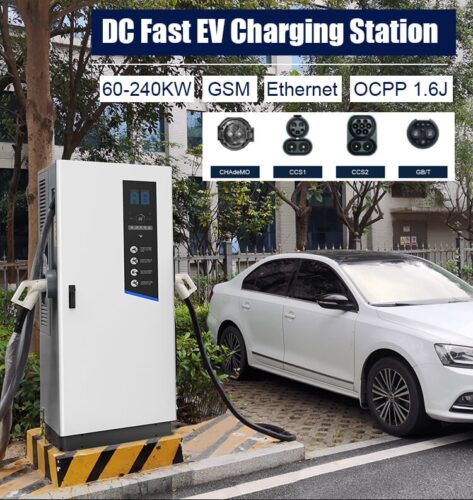The Future is Electric: Exploring the Exciting World of EV Charging Solutions
The introductions of ev charging solution:
- The switch to sustainable transportation has come to be recognized as a critical answer as the globe struggles with the problems of climate change and environmental deterioration. With less greenhouse gas emissions and better air quality than conventional internal combustion engine cars, electric vehicles (EVs) have gained popularity. However, providing dependable and effective EV charging infrastructure is essential for the mainstream adoption of EVs.
- An in-depth discussion of the role that ev charging solutionsplay in enabling sustainable mobility is provided in this article. Electric vehicles (EVs) are emerging as a crucial option to reduce emissions and battle climate change due to the rising environmental difficulties that the world is facing. The creation and adoption of effective and convenient EV charging solutions have turned into crucial steps in this revolutionary path as the popularity of EVs continues to surge.
- It is impossible to exaggerate the significance of EV charging infrastructure. It is essential in enabling the widespread use of electric cars, which is what is causing the transition to cleaner and more environmentally friendly transportation. With a dependable way to refill electric vehicles, a well-established and strong charging network is always one of the main worries of prospective EV buyers, range anxiety.
The Future is Electric: Exploring EV Charging Solutions:
The infrastructure and technology created to quickly and conveniently charge electric cars are called electric vehicle (EV) charging solutions. Many EV charging options exist, from office charging installations to public charging stations and residential charging arrangements. The following are some typical EV charging options:
- Charging stations at home:
EV owners may charge their vehicles overnight or when there is a low demand for power, thanks to the installation of home charging stations in residential buildings. Usually connected to the house’s electrical system, these charging stations offer Level 1 (120V) or Level 2 (240V) charging choices. For home usage, Level 2 charges are quicker and more prevalent.
- Public Charging Stations:
Public charging stations may be found around the city, including in parking lots, rest areas, retail malls, and public streets. Level 2 and DC rapid charging (Level 3) options may be available at these charging stations. Rapid charging is provided by DC fast chargers, making them ideal for extended trips or quick top-ups.
- Workplace Charging:
Several firms provide workplace charging stations to assist their staff members who drive electric vehicles. Workplace charging makes owning an EV more convenient and promotes environmentally friendly commuting by allowing owners to charge their vehicles at work.
- Fast Charging Networks:
Businesses and organizations frequently set up fast-charging networks along highways and important thoroughfares to make it easier for electric vehicles to drive long distances. These networks often include DC fast chargers, which can swiftly and efficiently charge the car’s battery.
- Wireless Charging:
Using magnetic fields instead of physical cords, wireless EV charging systems—called inductive charging—transfer energy from a charging pad to the vehicle’s receiver coil. Although this technology is still developing, it can potentially improve charging processes.
- Solutions for Smart Charging:
Smart ev charging solutions employ sophisticated algorithms to tailor charging periods based on power use, grid circumstances, and driving habits. These technologies aid in managing EV charging loads to reduce demand on the grid during peak times and guarantee effective energy use.

Infrastructure for EV Charging at present:
Although EV charging infrastructure growth has made steady progress, there are still obstacles to overcome:
- Charging Speed:
Fast charging technology is necessary to make recharging with electricity as simple as refilling with gasoline. While guaranteeing battery safety and durability, charging times must be improved.
- Interoperability:
The various charging protocols and networks might need to be clarified for EV owners. Whatever the brand of the charging station, creating a consistent, interoperable system will enable smooth charging.
- System Capacity:
To handle the increased electricity demand during peak charging periods, it is necessary to carefully plan the integration of many EVs into the power system and modernize the infrastructure.
Unleashing the Potential of EV Charging Solutions:
It is impossible to emphasize the value of EV charging infrastructure. It is essential for enabling the widespread use of electric cars, which is what is causing the transition to cleaner and more environmentally friendly transportation. By offering a dependable way to recharge electric cars, a well-established and strong charging network is always one of the main worries of potential EV buyers, ranging from anxiety. It enables drivers to go out on lengthier trips, knowing they can find recharge stations along the route.
- Also, by reducing harmful emissions. The development of electric vehicle charging infrastructure can help improve urban air quality and make cities healthier and more sustainable places to live. In addition, it offers the opportunity to integrate renewable energy sources such as solar and wind into the grid. The result is cleaner transportation.
- However, the infrastructure for EV charging has several difficulties at the moment. To guarantee a smooth and effective charging experience for EV consumers, problems, including charging speed, compatibility, and grid capacity, need to be solved. Fortunately, current developments in the EV charging scene, including ultra-fast charging, wireless charging, vehicle-to-grid (V2G) technology, and AI-driven smart charging solutions, are set to completely transform the sector.
Conclusion:
The article will examine EV charging solutions role in improving environmentally friendly transportation. We want to shed light on the way towards a cleaner and more sustainable future, where electric cars and their charging solutions enable sustainable mobility worldwide, by analyzing the condition of the present EV charging infrastructure and the cutting-edge solutions on the horizon. The company KINOUWELL has a great capacity to maintain its products and can provide consumers with comprehensive solutions and technical assistance. Our customers may also take advantage of OEM and ODM services thanks to our skilled R&D department.

